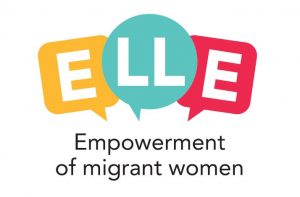EU-Programme: Erasmus+, KA2, Strategic Partnerships for Vocational Education and Training
Coordination: Falep2PB (France)
Website: https://www.elleproject.eu

Without being able to communicate, read and write in the language(s) of the country of destination, it is very hard for migrants to get a job, receive further education, or build up community relationships (Language Competences for employability, mobility and growth…) IGRANT WOMEN are one of the most disadvantaged groups in the EU in terms of labour participation and social inclusion.Among the migrant women, low-educated adults go through greater challenges in achieving linguistic integration to the new environment.
THEY ARE SO-CALLED LESLLA (Low-Educated Adult Second Language and Literacy Acquisition) learners, consisting of those who lack the ability to read and write in the script of their mother tongue (L1) or whose ability is below average primary school level. Also, they may be unfamiliar with classroom interaction and lack what is often dubbed “study skills”, such as organizing papers in a binder, dating new papers, reviewing new material, or doing homework. When they learn an L2, they show slower progress.
The aim of the ELLE is to apply innovative adult learning methods for the improvement of foreign language proficiency of low skilled migrants, refugees and asylum seeker women who have not acquired study skills, empowering them for their social and labour integration and active participation in society. To do so, the project will equip teachers, trainers, volunteers and educators of adult education with the necessary skills and innovative tools to improve foreign language proficiency of low skilled migrant, refugee and asylum seeker women and to empower their active participation in society.
ADULT EDUCATION EXPERTS and providers and organisation supporting low-qualified migrant women from 5 countries (France, Germany, Ireland,Spain and Sweden) will work together addressing the specific needs of the low-qualified migrant women in Europe through a coherent combination of acquisition of literacy skills, learning the national language of the country of residence and empowerment to develop leadership skills, never explored, attempted and tested before, applying innovative pedagogical approaches, like Cooperative learning and contextual Meaning-based learning. The project will use European frameworks and instruments, like EQF Europass and EPALE, to boost transparency and recognition of learning outcomes on LESLLA in Europe, with the active support and cooperation of a network of key associated partners and relevant stakeholders at local, regional, national and European level involved in the project.